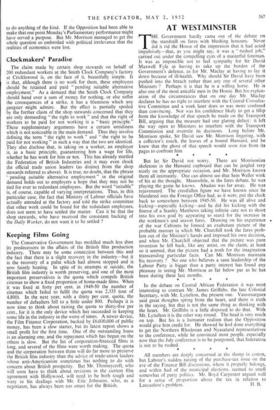The Fares Imbroglio
The effect of Monday's Commons debate on fare in- creases was to make clearer the exact reasons why the Government intervened to prevent the rise which had been due to take place on May 1st, but it did nothing whatever to unravel the tangle into which the whole question of the control of fares in the nationalised industry has fallen. Sir David Maxwell Fyfe at least gave the Government's case a semblance of consistency, by insisting that the intention was to prevent increases in sub-standard fares out of all proportion to those applicable to the public enerally. But it was no more than a semblance. The proper relationship between sub- standard fares and other fares is still not determined. It is nonsense to argue that because some people (how many ?) may have selected their place of residence in order to get the benefit of a cheap fare that fare becomes sacrosanct. It is not the business of the Government to shelter such arbitrarily chosen groups of the population from the normal hazards of the economic system. The tendency of the T-ransport Commission to sweep away special fares may not be completely logical either. After all, many low fares were introduced for the purpose of increasing the railways' earnings by inducing the public to make use of equipment which would otherwise be expensively idle. But that is a much better reason for making concessions than the Government have been able to produce. It would help the railways to pay their way. All the Govern- ment have done is to make it more difficult for the railways to do anything of the kind. If the Opposition had been able to make that one point Monday's Parliamentary performance might have served a purpose. But Mr. Morrison managed to get the whole question so embroiled with political irrelevance that the realities of economics were lost.



































 Previous page
Previous page